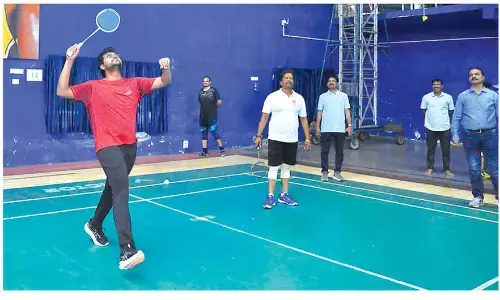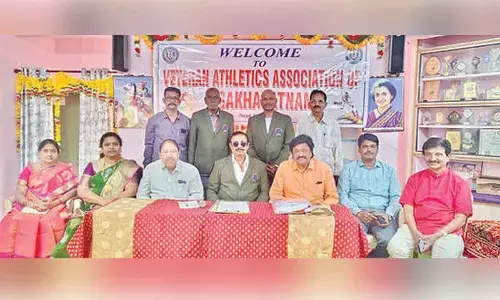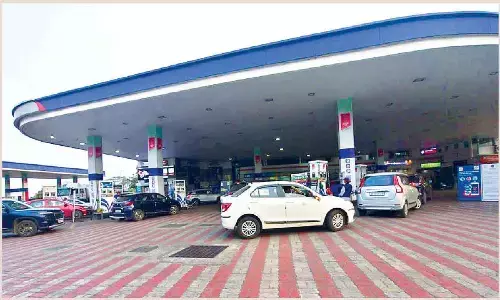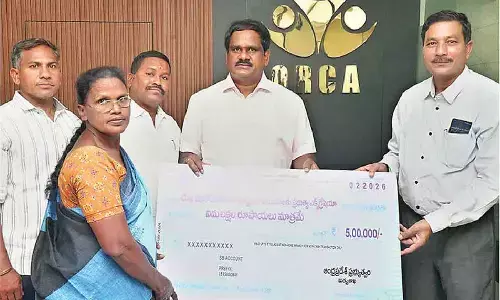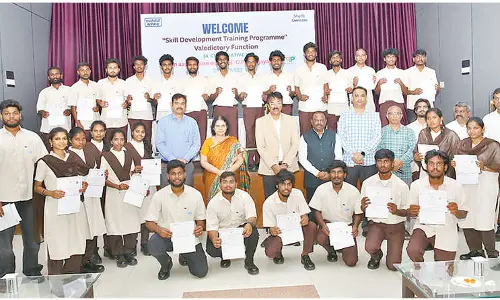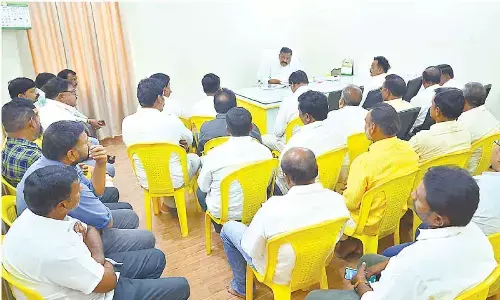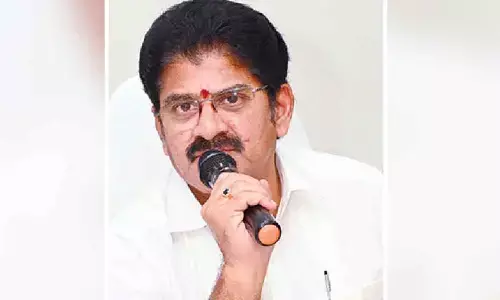Using tech to revitalise NREGS

Technology can work wonders when it comes to solving problems in business processes. The same can be true even with regard to government schemes when appropriate technology is combined with a will to serve people.
Mirdoddi (Siddipet): Technology can work wonders when it comes to solving problems in business processes. The same can be true even with regard to government schemes when appropriate technology is combined with a will to serve people.
Things then become easy not only for the common people, but also for the administrators whose duty is to ensure that the fruits of development reach every person in any State’s developmental model. Two young tech-savvy activists are making a difference in the government sector by simultaneously increasing the number of workdays and reducing by 50% the delay in disbursement of wages to workers under the Mahatma Gandhi National Rural Employment Generation Scheme (MGNREGS).
B Chakradhar Buddha alias Chakri and K Venkateswarlu alias Venky, are two young graduates with an eye for detail, who have been working to ensure transparency and effectiveness of NREGS, which aims to provide employment to every person in rural India. The youngsters, along with a dedicated team, have been working through Liberation Technology India (LIBTECH), an organization working on a Standford University’s project, titled ‘Using technology to curb corruption’. The organization has taken up NREGS as a subject to implement the project.
Despite the size of NREGS and the range of functional and technical issues in its implementation, the common issues are that not many are getting enough workdays and that there are many workers who haven’t been paid for the work they may have done two to three years ago. These are the issues that Chakri and Venky picked for intervention.
One of the ways in which they did this was by taking up Gattu mandal in Jogulamba-Gadwal district as well as Damaragidda and Maddur mandals in Mahbubnagar district as sample targets for implementing their ideas. They started off with what they like to call ‘Upaadhi Haami Phone Radio’.
It is not a traditional radio, but is a kind of radio service, using which they disseminate information to the workers in these mandals by sending voice recordings to cell phones of the workers. Information like when their wages have been deposited in their postal accounts or banks, when their pay order has been generated, and other vital information to spread awareness about NREGS scheme among the workers is sent directly to the workers through this innovative radio service.
The technology, developed by LIBTECH, could be used in villages where NREGS Field Assistants are either inactive or absent. There is also an application developed by them to accept work demand and communicate with workers and government functionaries, which makes it easy for officials to schedule work.
“The problem with the websites of NREGS in Andhra Pradesh and Telangana is that data available in the tables is too complicated for even a well-educated person to understand. We map this data to our own formats to make it understandable for us.
Then whenever there is a need for us to intervene, let’s say a group of workers have not received payments or if work is not being given to them, we can find out through technological radars and data alerts we have developed, to try and figure out the reasons for delay in wages and non-scheduling of work. We act as a liaison between MPDOs, PDs and the workers and help resolve the issues,” said Chakri, sharing the specifics of their intervention.
One of the problems with payments is that when the muster with details and measurements of the work done gets closed, within 15 days payments are supposed to be made as per the NREGA. Pay order is supposed to be generated and fund transfer order needs to be generated with two signatures required on it. Due to this process delay has been happening, he says.
In case of a discrepancy, an inquiry needs to be done by an official at the level of Project Director. This is another cause for delay in payment of wages, he points out. Technical Assistants not doing measurements of the work done is another cause for pay order not being generated, according to him. While these are just some of the concerns at the micro level in the implementation of NREGS; at the macro level, the problem is with the Central Government, he avers.
The organization has done extensive research in 12 states where they are working. Their observations have led them to a conclusion that there seems to be a deliberate attempt by the Centre to delay making NREGS payments to states not being ruled by the BJP.
“We have seen that it took 9 days for fund generation and processing of payment to workers in Jharkhand, whereas it took 80 plus days in Kerala,” he pointed out. He also finds fault with the way labour budget approval is being given to different states in India.
“While labour budget estimates sent by Telangana to Centre for 2017-18 was Rs 24 crore days, only Rs 8 crore days have been sanctioned for Telangana, whereas Rajasthan had sent estimates for Rs 23.2 crore days and they have been given Rs 23.1 crore days already.
Once the approval for labour budget is given and the work is completed, sending a new approval is a time-consuming process and till that new budget is approved, work must be stopped. This is one of the problems Telangana is facing with the Centre,” he added.
According to him, the root of the problem regarding payment lies with the Centre, though States share 20 per cent. There is a system of recovering money for delay in payments and the Telangana government has done that by recovering Rs 15 crore through APonline, an implementing partner for disbursement of payments, but strangely the Centre has not been made accountable ever.
He also points out that as per the Act, after demand for work is established and within 15 days a worker doesn’t get work, then the worker is entitled to unemployment allowance which is seldom paid. “There were 3.65 claims for unemployment allowances which were pending as updated till March 31, 2016. This is the responsibility of the State government to make these payments which amount to Rs 130 crore,” he said.
As a way to implement NREGS effectively covering the entire needy BPL population across India, currently Rs 78,500-crore budget would need to be allocated for NREGS. However, Rs 42,000 crore has been allotted in the present budget for NREGS and Rs 6,000 crore are last year’s payment arrears, he adds. He cautions that the current move to roll out AP and Telangana NREGS websites to the website of National Informatics Centre’s (NIC) website would be detrimental to the scheme’s implementation in both the Telugu states.
“Right now, any discrepancies could be resolved at the mandal/district-level, but if it is moved to the Centre’s NIC website, it would become next to impossible to resolve the issues because then we would have to constantly contact the NIC officials in New Delhi,” he cautioned.
However, he personally feels, through his research and understanding, that NREGS has reached ‘amazing levels of efficiency in curbing corruption’ and is an effective ‘drought-mitigation policy’ presently addressing poverty in at least some way.
Chakri and Venky, with the help of Dalit Bahujan Front, are currently working in Mirdoddi mandal of Siddipet district, by involving NREGS workers and government officials, using their broadcasting, intervention and advocacy methods to help achieve more efficiency in the implementation of NREGS in the mandal.
While Chakri is the techno-functional expert, Venky is an expert in addressing grievances of workers and in many cases, grievances of officials pertaining to NREGS.
By Vivek Bhoomi


